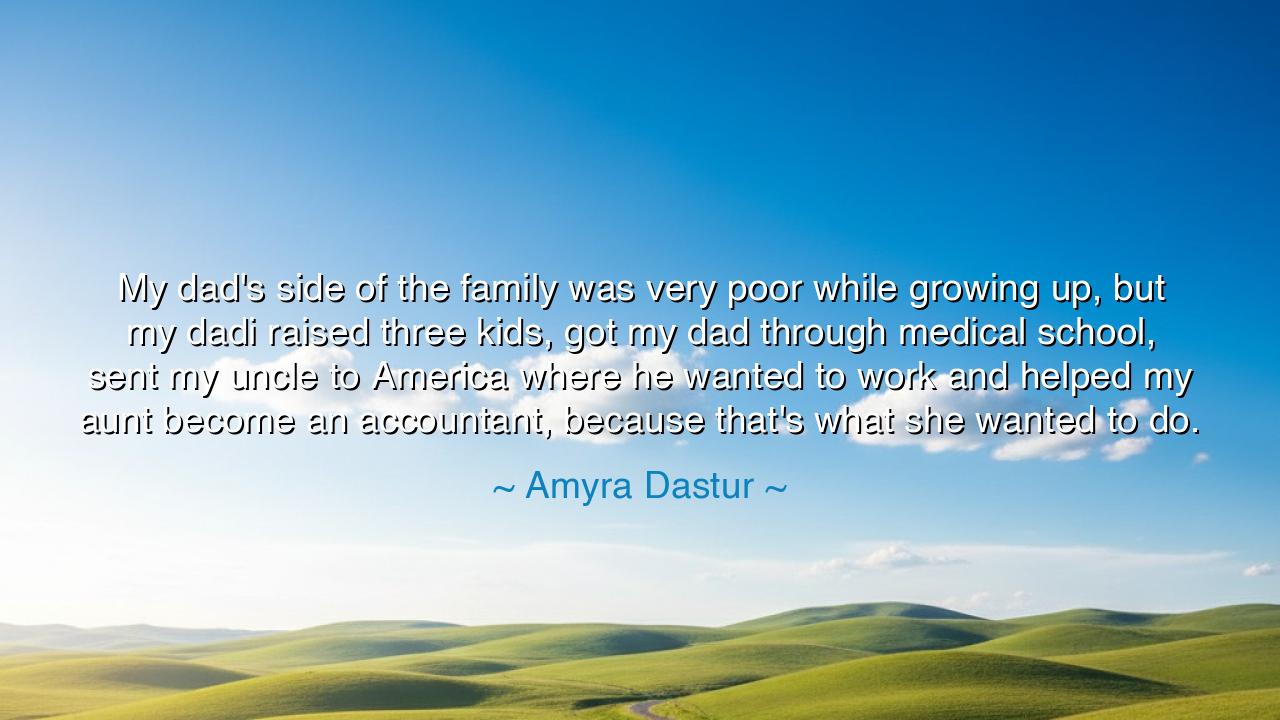
My dad's side of the family was very poor while growing up, but
My dad's side of the family was very poor while growing up, but my dadi raised three kids, got my dad through medical school, sent my uncle to America where he wanted to work and helped my aunt become an accountant, because that's what she wanted to do.






In the ancient struggle between hardship and hope, there are stories of perseverance and love that echo through time, reminding us of the transformative power of family, sacrifice, and determination. Amyra Dastur, in her reflection, speaks of her family’s remarkable journey: "My dad's side of the family was very poor while growing up, but my dadi raised three kids, got my dad through medical school, sent my uncle to America where he wanted to work, and helped my aunt become an accountant, because that's what she wanted to do." These words resonate with the timeless power of family bonds, the deep sacrifices that parents make, and the unwavering belief in the potential of the next generation.
In the ancient world, the concept of family was revered not just as a biological connection, but as the foundation of all societal values. The Romans, for example, placed great importance on the family unit. Patriarchs and matriarchs held immense responsibility in shaping the lives of their children, ensuring that they had the resources to rise above their circumstances. It was the wisdom of the elders, passed down through generations, that created the legacy of strength in the face of adversity. The story Dastur shares is no different: it is a tale of an indomitable mother who, despite poverty, dedicated her life to raising her children with the tools they needed to rise above their beginnings. Her actions reflect an ancient truth—that sacrifice and love for one’s family transcend material wealth.
Consider the story of Aristotle, whose life was marked by both privilege and struggle. As a teacher to Alexander the Great, he guided the young prince in learning not only about the world but about the nature of humanity. Aristotle himself came from a humble family, yet he rose to become one of the greatest minds of his time. His journey reminds us that success does not come solely from wealth, but from the dedication to one's craft and the support of those who believe in us. Just as Aristotle’s family supported him, Dastur’s dadi ensured her children had the opportunity to succeed, giving them the tools they needed to break free from the limitations of their early life. Her selfless efforts demonstrate the powerful role that family plays in shaping not only individual futures but the collective strength of a community.
The sacrifice of Dastur’s dadi reflects the timeless virtues of selflessness and empowerment. She did not merely raise her children, but actively invested in their futures, making sure they had the freedom to follow their own dreams, no matter how far they had to reach. This is a legacy built on the belief that a child’s potential is not confined by circumstance but by the love and effort of those who support them. Her determination to see her children rise above their humble beginnings mirrors the ancient wisdom that family is the wellspring from which greatness flows.
Just as the story of Dastur’s dadi is one of deep sacrifice and determination, it also speaks to the transformative power of education and opportunity. The act of helping her children achieve their dreams—whether it was becoming a doctor, an accountant, or pursuing work abroad—reminds us of the value of empowerment through education. In the ancient Chinese tradition, the great philosopher Confucius emphasized the importance of education as a path to both personal growth and societal harmony. By investing in the education and development of her children, Dastur’s dadi was not only lifting her family but contributing to the greater good of society, ensuring that her descendants would be able to contribute meaningfully to the world.
The lesson that emerges from Dastur’s reflection is clear and profound: sacrifice, empowerment, and love are the cornerstones of familial legacy. The acts of a mother who supports her children’s dreams, regardless of financial status, are what create the foundation for future success. This is a timeless truth that has echoed through the ages, from the ancient matriarchs to modern families today. Just as Dastur’s dadi lifted her children from poverty, so too can each of us work to uplift and empower those we love, offering them the tools they need to succeed.
In your own life, reflect on the ways in which you can empower the next generation. Whether it is through sacrifice, education, or the encouragement of dreams, each of us has the power to shape the future of those we care about. By investing in the potential of others, as Dastur’s dadi did, we create not just individual success but a legacy that will inspire and transform communities for generations to come. Let us carry forward the wisdom of sacrifice, empowerment, and family, knowing that it is through our love and efforts that greatness is achieved.






AAdministratorAdministrator
Welcome, honored guests. Please leave a comment, we will respond soon